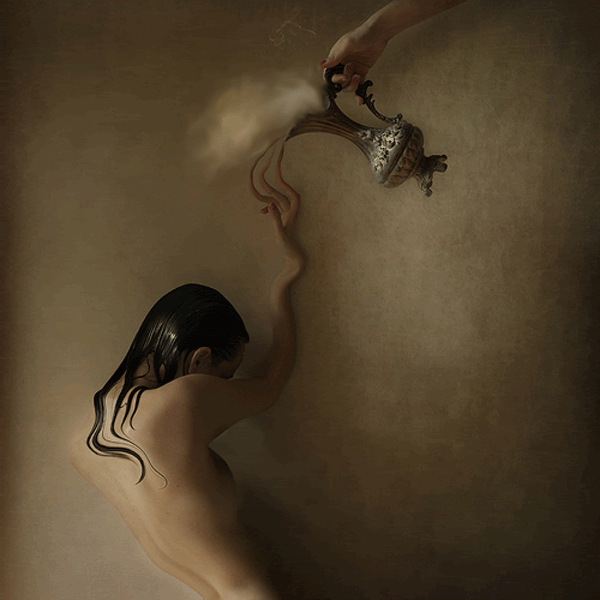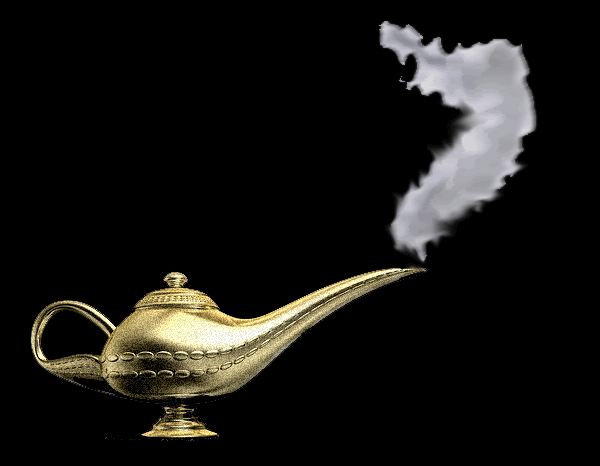|

unkown artist


The feminine version of Genie is Jinniyah, plural Jinn in Arabic and Islamic folklore, and is a spirit or demon endowed with supernatural power. In ancient belief the jinn were associated with the destructive forces of nature. In Islamic tradition they were corporeal spirits similar to men in appearance but having certain supernatural powers, especially those of changing in size and shape. Capable of both good and evil, the jinn were popular in literatures of the Middle East, notably in the stories of the Thousand and One Nights. The term genie is the English form and is sometimes confused with the Roman genius.

Etymology
Genie is an Anglicization of the original Arabic term jinn. However, it may not have come directly into English language but rather through sources in Latin or French or even Spanish. It may have first been used in English as geny to mean a guardian spirit, with the first recorded use in 1655. The word came from the French genie, which in turn came from the original Latin word genius, for a spirit. The extension of meaning to the powerful spirit of Muslim mythology appeared in 1748 by French translators using the French term genie. The definition referring to the powerful mythological spirit has since become dominant.

Jinn in pre-Islamic mythology
For the ancient Semites, jinn were spirits of vanished ancient peoples who acted during the night and disappeared with the first light of dawn; they could make themselves invisible or change shape into animals at will; these spirits were commonly believed to be responsible for diseases and for the manias of some lunatics. Types of jinn include the ghul (night shade, which can change shape), the sila (which cannot change shape) and the ifrit.
The Arabs believed that the jinn were spirits of fire, although sometimes they associated them with succubi, demons in the forms of beautiful women, who visited men by night to copulate with them until they were exhausted, drawing energy from this encounter just as a vampire is supposedly sustained by his victim's blood.
The jinn are said to be creatures with free will, made from 'smokeless fire' by God (the literal translation being "subtle fire", i.e., a fire which does not give itself away through smoke), much in the same way humans were made of clay. In Islam, unlike in Christianity and Judaism, Satan or Iblis is believed to be a jinn (which have free wills), which he became by his devotion and prayer to God (Jinn were created before humans). Jinn have free choice, and Iblis exploited this in front of God by refusing to bow to Adam when ordered to do so by God. By refusing to obey God's order he was thrown out of the Paradise and called "Shaitan" (See Shaitan). In the Qur'an, jinn are frequently mentioned and Sura 72 of the Qur'an named Al-Jinn is entirely about them. Another Sura (Al- Naas) mentions the Jinn in the last verse. In fact, it is mentioned in the Qur'an that Muhammad was sent as a prophet to both "humanity and the jinn."
The jinn have communities much like human societies: they eat, marry, die, etc. They are invisible to humans, but they can see humans. Sometimes they accidentally or deliberately come into view or into contact with humans. Jinn are believed to live much longer than humans. Jinn are beings much like humans, possessing the ability to be good and bad. An "Ifrit" is a type of strong and powerful jinn. Evil or malicious jinn are called "Marid"; usually, they are malicious due to their feeling that they have been usurped by humans, as in the case of "Shaitan". To protect oneself against evil jinn, Muslims say the Arabic phrase, "A'oo Thu Billahi min Ash Shaitan Arrajim" (meaning: O God, I seek refuge in You , from Shaitan the rejected). This phrase is not used exclusively to protect oneself from jinn. It is mostly used when beginning recitation of the Quran; the devil should be cast away before recitation; the phrase is used anytime one feels the need to keep the devil away. One is also encouraged to recite different Surahs from the Quran - such as Surah Falaq, Surah Naas and Surah Baqarrah (Especially Ayat al-Qursi in Baqarrah). Many people say the four "Quls", meaning Surah Falaq, Surah Naas, Surah Ikhlaas, and Surah Kafiroon. (Each surah starts with the Arabic word "Qul" which means "Say.") In addition, reading at least 50 ayats (verses) of the Quran will protect against Jinn.
Jinn have the power to transform into other animals and humans, and they are known to prefer the form of a snake. Because they are made of fire, they can appear in any color. It is also known that they eat bones and their animals eat droppings; that is why it is forbidden to perform Istinja (washing) with those items. According to the majority of Islamic scholars, the Qur'an states that the Shaitan or Iblis or Devil was not an angel (which is believed by Christians), but a jinn who was given higher honour and rank than angels. According to Islam, angels are different physical beings, made from light and without the fiery nature of jinn. Angels are beings of goodness and cannot choose to disobey God since they do not possess free choice like humans and jinn (therefore, they do not possess the ability to do evil.)
Evil beings from among the jinn are roughly equivalent to the demons of Christian lore. In mythology, jinn have the ability to possess human beings, both in the sense that they persuade humans to perform actions, and in that of the Christian perception of demonic possession. In the Qur'an, Prophet Solomon (Arabic: Suleiman) had members of his army belonging to the race of jinn. Solomon had the ability to communicate with all creatures, which allowed him to communicate with the jinn as well.

Jinn in post-Islamic Arabic Fiction
Evil Ifrit in The Book of One Thousand and One Nights are called "the seed of Iblis".
The Spirit of the Lamp in the story of Aladdin was such a jinni, bound to an oil lamp. Ways of summoning jinn were told in The Thousand and One Nights: by writing the name of God in Hebraic characters on a knife (whether the Hebrew name for God, Yaweh, or the Arabic Allah is used is not specified), and drawing a diagram (possibly a pentagram) and strange symbols and incantations around it.
The jinn's power of possession was also addressed in the fictional Nights. It is said that by taking seven hairs out of the tail of a cat that was all black except for a white spot on the end of its tail, and then burning the hairs in a small closed room with the possessed, filling their nose with the scent, this would release them from the spell of the jinn inside them.

Jinn in the Occult
In sorcery books Jinn are classified into four races after the classical elements, Earth, Air, Fire; (Ifrit) and Water; (Marid) and presumed to live in them. They are collected in tribes, usually seven, each with a king. Each king controls his tribe and is controlled by an Angel. The Angel's name is torture to the jinn king as well as his specific tribe.
Unlike white and evil witches, Jinn have free will; yet, they could be compelled to perform both good and evil acts. In contrast a demon would only hurt creatures, and an angel would only have benevolent intentions (white witchcraft). Knowing what to ask a spirit to perform is key, as asking a spirit to perform a chore that runs counter to its natural tendencies could possibly anger the spirit into retaliating against the sorcerer.

Genies in Western Culture
The Western interpretation of the genie is based on the Aladdin tale in the Western version of The Book of One Thousand and One Nights, which told of a genie that lived in an oil lamp and granted wishes to whoever freed him from the lamp by polishing it. The number and frequency of wishes varies, but typically it is limited to three wishes. More mischievous genies may take advantage of poorly worded wishes (including the Fairly Odd Parents and in an episode of The X-Files).
Many stories about genies tend to follow the same vein as the famous short story The Monkey's Paw by W. W. Jacobs, with the overriding theme of "be careful what you wish for"; in these stories, wishes can have disastrous, horrific and sometimes fatal consequences. Often, the genie causes harm to the loved ones or innocent people surrounding the wisher, making others pay for its master's greed or ignorance.
Exploiting loopholes or twisting interpretations of wishes is a classic trait amongst genies in Western fiction. For example, in "The Man in the Bottle" episode of The Twilight Zone, a poor shopkeeper who finds a genie wishes to become a leader of a great nation - and is transformed into Adolf Hitler at the very end of World War II. Often, these stories end with the genie's master wishing to have never found the genie, all his previous wishes never to have happened, or a similar wish to cancel all the fouled wishes that have come before.


source:
http://www.crystalinks.com/
backgound and graphics by:

Next Back Home
|